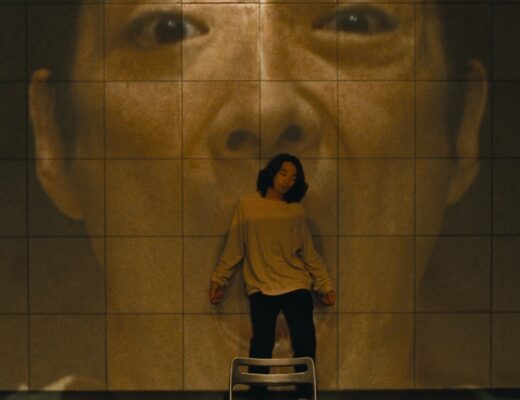Slow Machine introduces a directing duo happy to noodle and experiment with various modes, but who aren’t yet refined or cogent enough in purpose.
Jacques Rivette proved some decades ago that it’s possible to conjure a Langian cinema without Langian means, to describe the vast, malevolent architecture of modernity with little more than an empty stage, a shabby apartment, and a map of Paris annotated by a particularly paranoid scribbler. An ideal model for young artists conspiring to achieve sinister scope on a shoestring, though it’s one that has, historically, found little purchase among American independent filmmakers, who for the most part gravitate towards talky, homegrown realism. But perhaps as a consequence of lately revived interest in Rivette — following the 2015 restoration and re-release of Out 1 — or perhaps as a response to a contemporary world that seems increasingly explicable only through the logic of conspiracies — likely both — a cohort of young filmmakers based in New York City has recently decided to import the Night Watchman’s stratagems and try them out in their own backyard. Ricky D’Ambrose’s Notes on an Appearance, Bingham Bryant’s Foreign Powers, and now Paul Felten and Joe DeNardo’s Slow Machine all cast the gentrified milieu of the outer boroughs as a locus of intrigue, as if the lives of bohemian artists and trust fund layabouts are enmeshed with the secret order of the city. Well, these days they probably are: Brooklyn belongs to us. Then again, we might remember that Rivette also tells us that the city belongs to no one.
And so, Slow Machine, which follows an out-of-work actress forced to couch hop after suffering a murky act of roommate “retribution”, and who subsequently finds herself adrift in a universe of escalating dread, suggests that there is no single player pulling the strings from behind the curtain. Instead, there are many: the U.S. government, in the form of a garrulous undercover agent whose sole mission is to surveil those Bushwick art parties most critically important to national security; a cabalistic performance art troupe that, in the film’s best scene, convinces Chloë Sevigny to audition for them as they watch on ominously, silent and shrouded by mysterious black hoods; and, of course, the filmmakers themselves, who — like Langian spymasters of old — ask “who is behind all this?” so that they can loudly announce: “Us”. There’s nothing wrong with repurposing the Rivette model to help draft an impressive calling-card — the Cahiers crowd were nothing if not cunning self-promoters, and understood well the value of an ambitious debut — or with treating the conspiracy thriller as a generic game defined by an open ruleset, one which is flexible enough to accommodate experiments with American idiomatic speech, halting comedic rhythms, and sudden ruptures in space and time, all of which Felton and DeNardo toy with to varying degrees of success. And play — as a production method and a narrative mode — is indeed a legitimate place to start. Still, so much messing around does suggest that these young cineastes, while possessed of a robust toolkit, are not yet sure what kind of machine they’re trying to build. A slow one, I suppose we can say that much: it’s clear that Felton and DeNardo need a few more turns before they will achieve dungeon master status themselves. But because they so plainly wish to bend the rules, there’s no sure strategy to recommend them for their next game; as a bandleader says to her mates early in the film, as they fiddle with their instruments to see if something sticks: “I don’t have any advice for you guys, just play it better.”
Originally published as part of NYFF 2020 — Dispatch 5.







